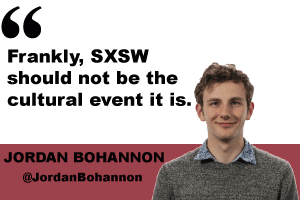 Every year, thousands of people flock to Indio, Calif.; Manchester, Tenn.; and Gorge, Wash. for the Coachella, Bonnaroo and Sasquatch! music festivals. These are just a few of the big-name music festivals that cater to a niche culture of road-trip-loving neo-hippies and provide huge economic boosts to small town economies by attracting music lovers from around the world.
Every year, thousands of people flock to Indio, Calif.; Manchester, Tenn.; and Gorge, Wash. for the Coachella, Bonnaroo and Sasquatch! music festivals. These are just a few of the big-name music festivals that cater to a niche culture of road-trip-loving neo-hippies and provide huge economic boosts to small town economies by attracting music lovers from around the world.
Make no mistake: There are hundreds more festivals, some of them small, some of them huge. However, hardly any of them — with the exception of maybe Coachella — carry the same clout as South By Southwest.
SXSW, a weeklong event that takes place in Austin, Texas, each year, is less of a festival and more of a massive convention. Companies host an insane number of concerts and parties. Technology companies unveil new products and other corporations let their advertising departments run wild.
Frankly, SXSW should not be the cultural event it is. The allure of free beer and free shows masks the high price barrier and the privatization of the music.
SXSW is a monster business convention and a stomping ground for the media elite, which in and of itself is not bad in anyway. However, the music and art are used as a metaphorical peanut butter that makes the pill of big business easier to swallow.
Last year after SXSW, DIIV’s Zachary Cole Smith officially went on the record saying “Hi, Austin. F--- SXSW.”
He further elaborated his brash statement by saying, “Here, the music comes last. Five minute set-up, no sound check, 15-minute set. The 'music' element is all a front; it's the first thing to be compromised. Corporate money everywhere but in the hands of the artists, at what is really just a glorified corporate networking party.”
Artists are by no means oblivious to the culture of SXSW. They do it at their own risk in the hopes of making a name for themselves. Record labels feel pressure to put on showcases in order to brand their bands and create hype for new releases.
This year, artists' discontent took the form of violence. Notorious rabble-rouser Tyler, the Creator incited a riot after he encouraged fans outside the venue to storm the gates and come into a private party.
The artists who travel to Austin to make a name for themselves and impress the industry scouts do so at a huge financial loss. Private parties and shows prevent the fans who travel to SXSW from seeing their favorite artists. And when the two parties grow increasingly frustrated, incidents like the one at the Tyler, the Creator show happen.
On a related note, Lady Gaga performed at a Doritos-sponsored event. At the show, it became clear that music doesn't speak for itself at SXSW. Artists need the magical dusting of a brand such as Doritos to hype the event.
Aside from the business and tech portion, SXSW is a great way for labels and the music industry, as well as the film industry to show off what is new and happening. But again the culture is more a convention than a festival. There are no unified grounds and no unified schedule. SXSW is a bunch of separate entities doing their own thing in their own manner. Which is not a consumer friendly model.
At the end of the day, SXSW is a glorified business convention, not a cultural event. It is not friendly to the consumer and its breakneck pace and its dispersed layout make it more of a journalist feeding ground than a festival.
Conventions are a really great way for companies to show off, but advertising SWSX under the guise of a music and film festival is simply false advertising.
Reach the columnist at jpbohann@asu.edu or follow him on Twitter @JordanBohannon




